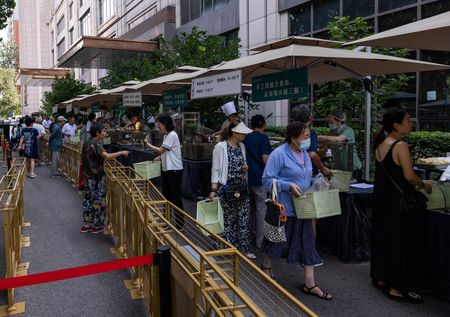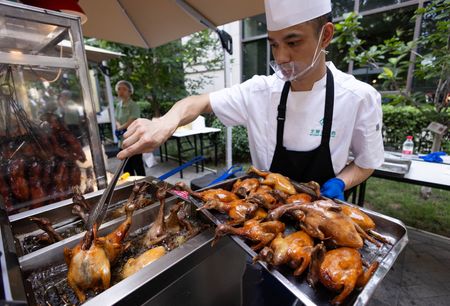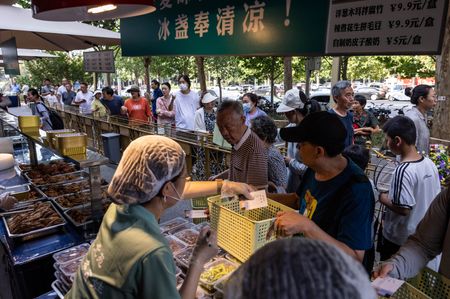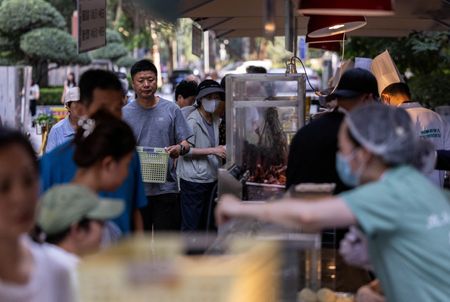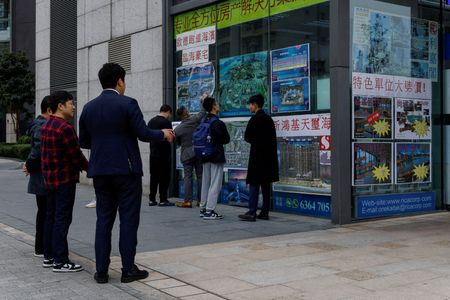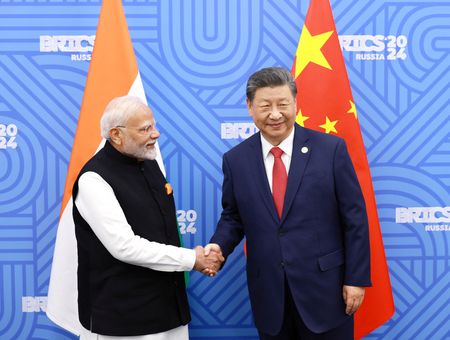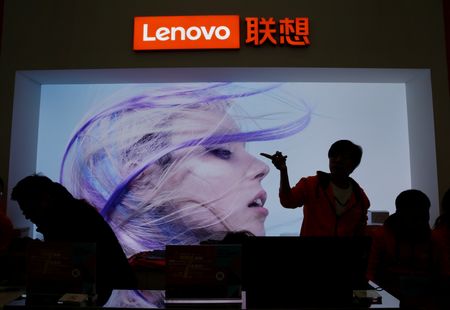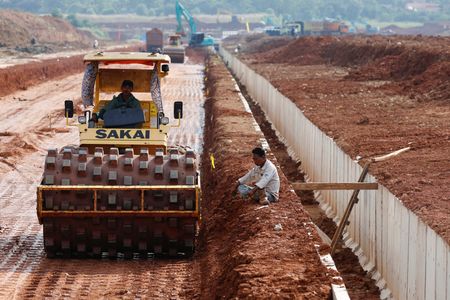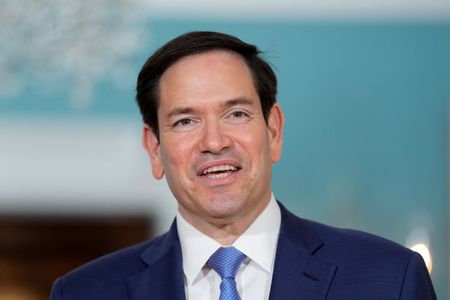By Claire Fu and Alessandro Diviggiano
SINGAPORE/BEIJING (Reuters) -Every evening, staff at Beiyuan Grand Hotel in Beijing set up street stalls selling freshly-cooked gourmet dishes trying to make up for falling revenue indoors as Chinese consumers and firms cut spending on travel, conferences and banquets.
“These days, it’s not that people will come just because you lower prices or offer discounts — they simply don’t come at all,” said Anwen Xu, its sales director, explaining the need to find new income streams.
Beiyuan is among at least 15 high-end hotels nationwide hawking food outside in recent weeks, according to their social media and Chinese news sites. Their sales had been hit by weaker consumer demand, cuts to corporate and official travel budgets and a lack of banquet reservations, staff said.
Xu said Beijing’s moves earlier this year to reinforce austerity and discipline among public sector workers and party members, including bans on dining out in large groups and curbs on alcohol consumption, had also hurt business.
Analysts say the hotel hawkers are another sign that deflationary pressures risk becoming entrenched in the world’s second-largest economy, whose growth leans more on manufacturing and exports than consumption.
Consumer prices were flat year-on-year in July.
“These high-end dining establishments, especially five-star hotels, are having to make strategic adjustments to survive,” said He-Ling Shi, an economics professor at Monash University in Melbourne.
“What this phenomenon reflects is that China’s overall economic situation is now facing a fairly significant risk of deflation.”
Analysts also cite 3 yuan ($0.40) breakfasts and supermarkets offering flash sales as deflationary signs.
China’s catering revenue grew 0.9% year-on-year in June, down from 5.9% in May, official statistics showed. In the first half of 2025, accommodation industry profits in Beijing fell 92.9% year-on-year, according to government data.
“The food and beverage business has been under considerable pressure,” said Wei Zheng, a staff member at Grand Metropark Hotel in Beijing, which began selling street food on July 10.
“Many hotels have adopted methods such as selling outside to increase revenue,” added Wei, noting the hotel earns an extra few thousand yuan a day hawking braised duck, fish stew or crayfish.
Xu at Beiyuan said their outdoor bestseller was the hotel’s signature crispy roast pigeon at 38 yuan ($5.29) per bird, which is priced at 58 yuan on the menu inside.
Since opening on July 28, the stall has sold about 130 pigeons a day, compared to about 80 previously.
Within a few months, private dining-room use has fallen from full to about one-third, and average per-head spend inside has halved to around 100–150 yuan, Xu said.
She added the outdoor stall operates with a 10% to 15% margin, which she said was better than the average caterer but still not enough to fully offset the fall in business indoors.
‘HESITANT’ CONSUMERS
Yaling Jiang, founder of research consultancy ApertureChina, said consumers “continue to seek value and novelty in an economic downturn” but are “hesitant” when it comes to high-end spending.
Shopper Seven Chen, who bought barbecue pork, said he understood what the Beiyuan hotel was trying to do, adding that he was also staying in fancy hotels less often than in the past.
“The main thing is people don’t have enough income,” said Chen, who works in finance and lives nearby.
Others adopting a street food strategy, according to their social media accounts, include the JW Marriott in Chongqing and Hilton Wuhan Riverside in Wuhan. The latter did not comment, while a Marriott staffer said the hotel sells dishes outside from 5 p.m. to 6 p.m. They did not go into further detail.
The five-star River & Holiday Hotel in Chongqing, says its daily revenue surged to 60,000 yuan from just a few thousand after setting up food stalls in its car park last month.Marketing and sales manager Shen Qiuya dismissed online criticism that the practice could erode brand value.
“Every industry is facing difficulties this year,” Shen said. “Survival is the most important thing. Face isn’t worth anything.”
($1 = 7.1798 Chinese yuan renminbi)
(Reporting by Claire Fu in Singapore; Alessandro Divigiano in Beijing and Beijing newsroom; Editing by Marius Zaharia and Kate Mayberry)

